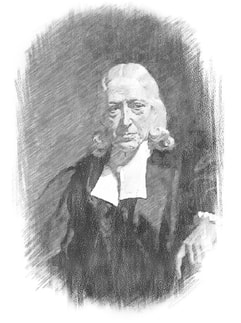Romans 11
|
Romans 11:6:
And if by grace, then it is no longer of works; otherwise grace is no longer grace. But if it is of works, it is no longer grace; otherwise work is no longer work. |
Upon election, being called "the election of grace", the apostle forms an argument, showing the contrariety and inconsistency of grace, and works, in that affair; proving, that it must be by the one or the other: and if by the one, then not by the other; and that these two cannot be mixed and blended together in this matter. If election is "by grace", as it certainly is; for no other reason can be given why God has chose one, and not another, but his own sovereign pleasure, or that free favour and unmerited love, with which he loves one and not another; and not because they are better, or had done or would do better things than others; "then it is no more", or not at all, for it never was "of works", was not influenced by them, does not arise from them, for it passed before ever any were done; and those that are done aright spring from it, and therefore could never be the rule and measure, causes, motives, and conditions of it [SOURCE: Bible Study Tools] |
|
Romans 11:7-12:
What then? Israel has not obtained what it seeks; but the elect have obtained it, and the rest were blinded. 8 Just as it is written: “God has given them a spirit of stupor, Eyes that they should not see And ears that they should not hear, To this very day.” 9 And David says: “Let their table become a snare and a trap, A stumbling block and a recompense to them. 10 Let their eyes be darkened, so that they do not see, And bow down their back always.” I say then, have they stumbled that they should fall? Certainly not! But through their fall, to provoke them to jealousy, salvation has come to the Gentiles. 12 Now if their fall is riches for the world, and their failure riches for the Gentiles, how much more their fullness |
Paul then goes on to explain that there are a relatively small number of ethnic Israelites who have obtained righteousness. These are “the elect”. They correspond to the “remnant” from verse 5. Paul distinguishes “the elect” from “the rest”. “The rest” is everyone else in ethnic Israel who is not “the elect”. (The Gentiles could also be categorised as “elect” and “non-elect”, but the context is clear that Paul is focusing on ethnic Israel in these verses. The hardening referred to is a hardening of some ethnic Israelites (not Gentiles). As the hardened ones are “the rest”, the “elect” ones must also be ethnic Israelites only.) -Predestination Station
So, the non-elect ethnic Israelites have been hardened: their eyes have been darkened and their ears do not hear. (A ‘stumbling block’ is also referred to in 9:33, which similarly speaks of the situation of the unbelieving ethnic Israelites.) A burden is weighing down on them and bending their backs. As they are not elect, and have had their eyes darkened etc., one might conclude that these non-elect ethnic Israelites will always remain in this state and will therefore never be saved. |
|
Romans 11:13:
13 For I speak to you Gentiles; inasmuch as I am an apostle to the Gentiles, I magnify my ministry |
An apostle was charged with great responsibility. The Greek word dates to the 5th century BC. An Apostle was a leader, settler, and wielded great authority. Apostles were able to make decisions and legally bind those represented. When Paul referred to himself as an apostle he was embracing a mission and a vision to establish Jesus’ kingdom on earth. -Michael Maynard |
Romans 11:14-19:
14 if by any means I may provoke to jealousy those who are my flesh and save some of them.
15 For if their being cast away is the reconciling of the world, what will their acceptance be but life from the dead?
16 For if the firstfruit is holy, the lump is also holy; and if the root is holy, so are the branches.
17 And if some of the branches were broken off, and you, being a wild olive tree, were grafted in among them, and with them became a partaker of the root and fatness of the olive tree,
18 do not boast against the branches. But if you do boast, remember that you do not support the root, but the root supports you.
19 You will say then, “Branches were broken off that I might be grafted in.”
14 if by any means I may provoke to jealousy those who are my flesh and save some of them.
15 For if their being cast away is the reconciling of the world, what will their acceptance be but life from the dead?
16 For if the firstfruit is holy, the lump is also holy; and if the root is holy, so are the branches.
17 And if some of the branches were broken off, and you, being a wild olive tree, were grafted in among them, and with them became a partaker of the root and fatness of the olive tree,
18 do not boast against the branches. But if you do boast, remember that you do not support the root, but the root supports you.
19 You will say then, “Branches were broken off that I might be grafted in.”
|
Romans 11:22-24:
22 Therefore consider the goodness and severity of God: on those who fell, severity; but toward you, goodness, if you continue in His goodness. Otherwise you also will be cut off. 23 And they also, if they do not continue in unbelief, will be grafted in, for God is able to graft them in again. 24 For if you were cut out of the olive tree which is wild by nature, and were grafted contrary to nature into a cultivated olive tree, how much more will these, who are natural branches, be grafted into their own olive tree? |
Paul said in Romans 11:22 to “consider the goodness and the severity of God.” Some ministries and believers pick one or the other—either God’s goodness while dismissing His severity or the other way around. Paul exhorted us to consider both. I believe the Holy Spirit is calling the Body of Christ to consider these—that is to search out, seek to understand, to be aware of, and proclaim both the truths related to His goodness and His severity. Not the goodness without severity, not severity without goodness, not one versus the other. Both of them because only in both extremes do we have what Paul described in Acts 20:27, the whole counsel of God. --Mike Bickel;Ihop |
Then he continues in verse 22 and gives us a strategy for maintaining faith with a proper use of fear: “Note then the kindness and the severity of God: severity toward those who have fallen, but God’s kindness to you, provided you continue in his kindness.” In other words, Paul says that since ongoing faith is utterly indispensable in being saved in the end, and since fear has a key role in helping us maintain faith, therefore, note something. Literally, “look” at something. Look at what? Look at two things: the kindness of God and the severity of God. Or we could say: look at the mercy of God and the wrath of God. Look at the tenderness of God and the toughness of God. Look at the salvation of God and the judgment of God. Look at the assistance of God and the opposition of God. Look at the friendship of God and the fierceness of God. Don’t look only at his gentler side. It will be bad for your faith. --John Piper
|
Romans 11:28-35:
28 Concerning the gospel they are enemies for your sake, but concerning the election they are beloved for the sake of the fathers. 29 For the gifts and the calling of God are irrevocable. 30 For as you were once disobedient to God, yet have now obtained mercy through their disobedience, 31 even so these also have now been disobedient, that through the mercy shown you they also may obtain mercy. 32 For God has committed them all to disobedience, that He might have mercy on all. 33 Oh, the depth of the riches both of the wisdom and knowledge of God! How unsearchable are His judgments and His ways past finding out! 34 “For who has known the mind of the Lord? Or who has become His counselor?” 35 “Or who has first given to Him And it shall be repaid to him?” |
 Cornelius Plantinga Cornelius Plantinga
In the first book of his famous Institutes of the Christian Religion Calvin treats God’s providence. To Calvin, God’s providence for creation is as impressive as creation itself. God launches the creation and then ”sustains, nourishes, and cares for” everything. There is no chance or luck.
How should we creatures receive the knowledge of God’s providence? Calvin sums up his thought in a key sentence: “Therefore no one will weigh God’s providence properly and profitably but him who considers that his business is with his maker [negotium cum Deo] and the Framer of the universe, and with becoming humility submits himself to fear and reverence”. For us human beings, the proper response to God is humility. Humility fits us, suits us. It’s “becoming” to us, says Calvin. The humble person knows God is their superior and they let God be God. They know the rest of us are on a par with them, and they let us be their equals. Humble people don't pretend to be more than they are.& Our problem, says Calvin, is that we try to judge God as if God were merely human—as if we had a right to judge God. We should listen to Paul in Rom. 11:33-34: “O the depth of the riches and wisdom and knowledge of God! How unsearchable are his judgments, and how inscrutable his ways!." --Cornelius Plantinga; Reformed Worship; Negotium Cum Deo: Our Business is with God 9.18.23 |
|
Romans 11:36:
36 For of Him and through Him and to Him are all things, to whom be glory forever. Amen. |
The message of 11:36 is that God is supreme:
|













